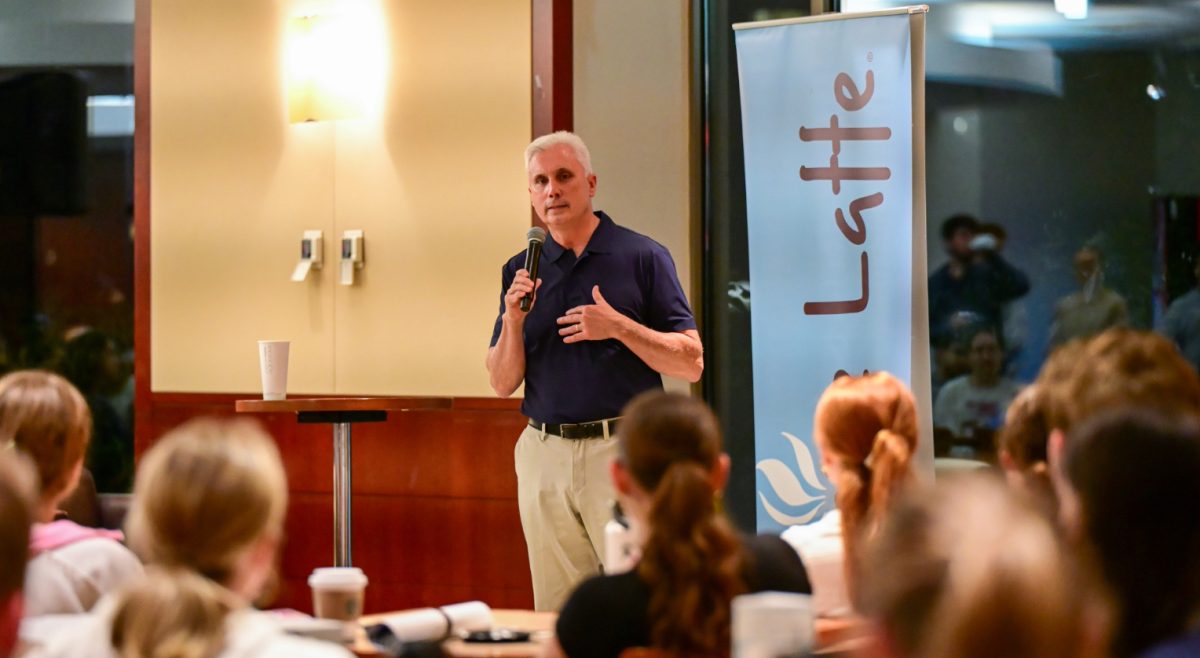
(Ellie El-Fishawy / Heights Editor)
University spokesman Jack Dunn shared stories about faith and forgiveness with students.
According to University spokesman Jack Dunn, forgiveness is a necessary component of a meaningful life.
“I want to talk to you about the power of forgiveness,” Dunn said. “In particular, the importance of letting go of those things that get in the way of us living our lives to the fullest.”
Dunn kicked off Espresso Your Faith week with the first Agape Latte talk of the 2025–26 academic year Tuesday night. In his deeply personal talk, Dunn reflected on how loss, faith, and the act of forgiving himself and others have shaped his life.
Despite the positive aspects of his life—including his wife and four children—Dunn said loss has been a prevalent occurrence, testing his faith.
In particular, Dunn mentioned the death of John, whom he mentored through the Big Brothers Big Sisters of America program. After earning a scholarship to Northeastern, John was stabbed to death in a street fight in Boston.
“That death rocked me to the core,” Dunn said. “I felt like somebody ripped my heart out.”
The losses did not end there. In short succession, he lost a friend to a drunk driver, another to colon cancer, and another to alcoholism.
“I’m going to get through it,” Dunn said. “I have my family, I have my faith, and I can still rely on my best friend.”
That best friend was Nick, Dunn’s graduate school roommate and a Greek Orthodox Yankees fan. As an Irish Catholic Red Sox fan, Dunn said he did not expect their friendship to blossom like it did.
“He was a person I was meant to meet in my life,” Dunn said. “We had so much in common. He’s one of those friends that just understood me.”
Nick was soon diagnosed with Amyotrophic Lateral Sclerosis (ALS), a fatal, neurodegenerative disease that left him with just two to three years left to live. Dunn said receiving the news shook his faith.
“That day, I was just floored,” Dunn said. “I remember saying, ‘God, I’m trying to hang in there, but you’re losing me.’”
After seeing Nick’s worsening condition over several visits, Dunn said he wanted to do something to help. He said Nick’s reply came as a surprise.
“He said, ‘I want you to go to confession,’” Dunn said. “And I said, ‘You got to be kidding me, confession?’”
Although a regular at Mass, Dunn said he rarely went to confession. For months, he put off going, making excuses—including seeing his ex-girlfriend’s mother in church—before eventually attending.
Dunn recalled that after laying out his sins, regrets, and shortcomings, he was met with kindness from the priest.
“In the end, he said to me, in the kindest of voices, ‘All this stuff you’ve been carrying around, let go of it,’” Dunn said. “‘God loves you unconditionally, and God wants nothing more than for you to be happy.’”
According to Dunn, Nick’s condition had worsened to the point where he was bedridden and unable to speak. Dunn said he thanked Nick, as the act of confession resonated deeply with him.
“‘I feel like all the stuff that I have been carrying around is gone, and I’ll never be able to thank you enough for what you did,” Dunn recalled explaining to Nick. “And he just burst into tears.”
Dunn’s stories resonated with the crowd, many expressing a renewed desire to connect with their faith and with others.
“I haven’t gone in nine years, but I’ll go this week,” one student said.
To conclude his talk, Dunn emphasized that forgiveness starts from within.
“May we understand the power of forgiveness, and be willing to forgive ourselves and others whom we love,” Dunn said. “It all begins with letting go of whatever it is that’s getting in the way, fear, anger, regret, shame, whatever. It all begins with letting go.”